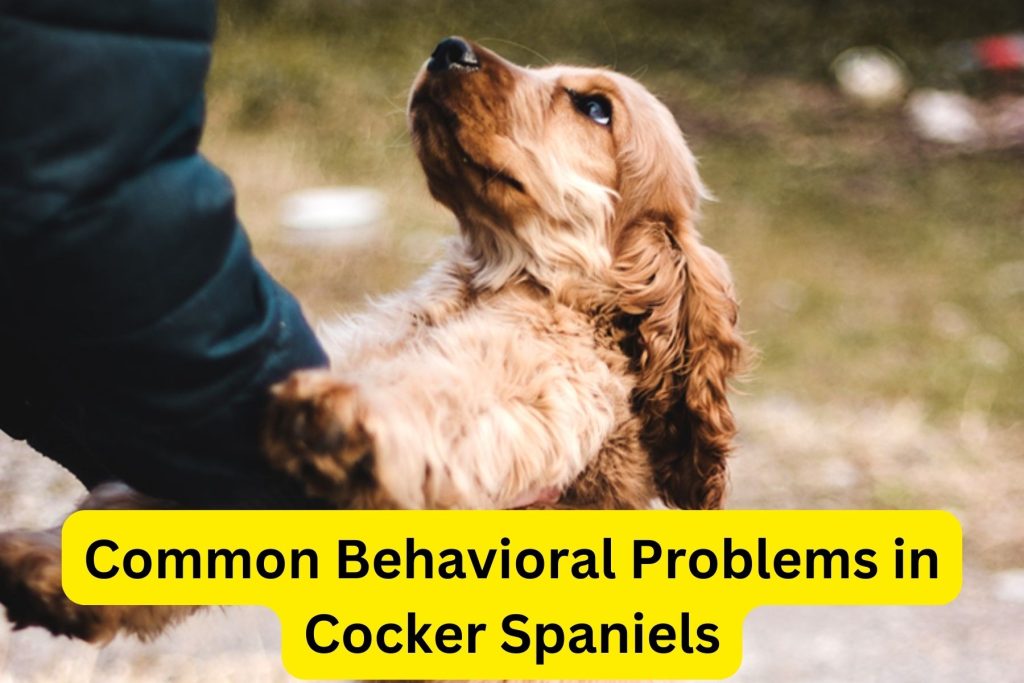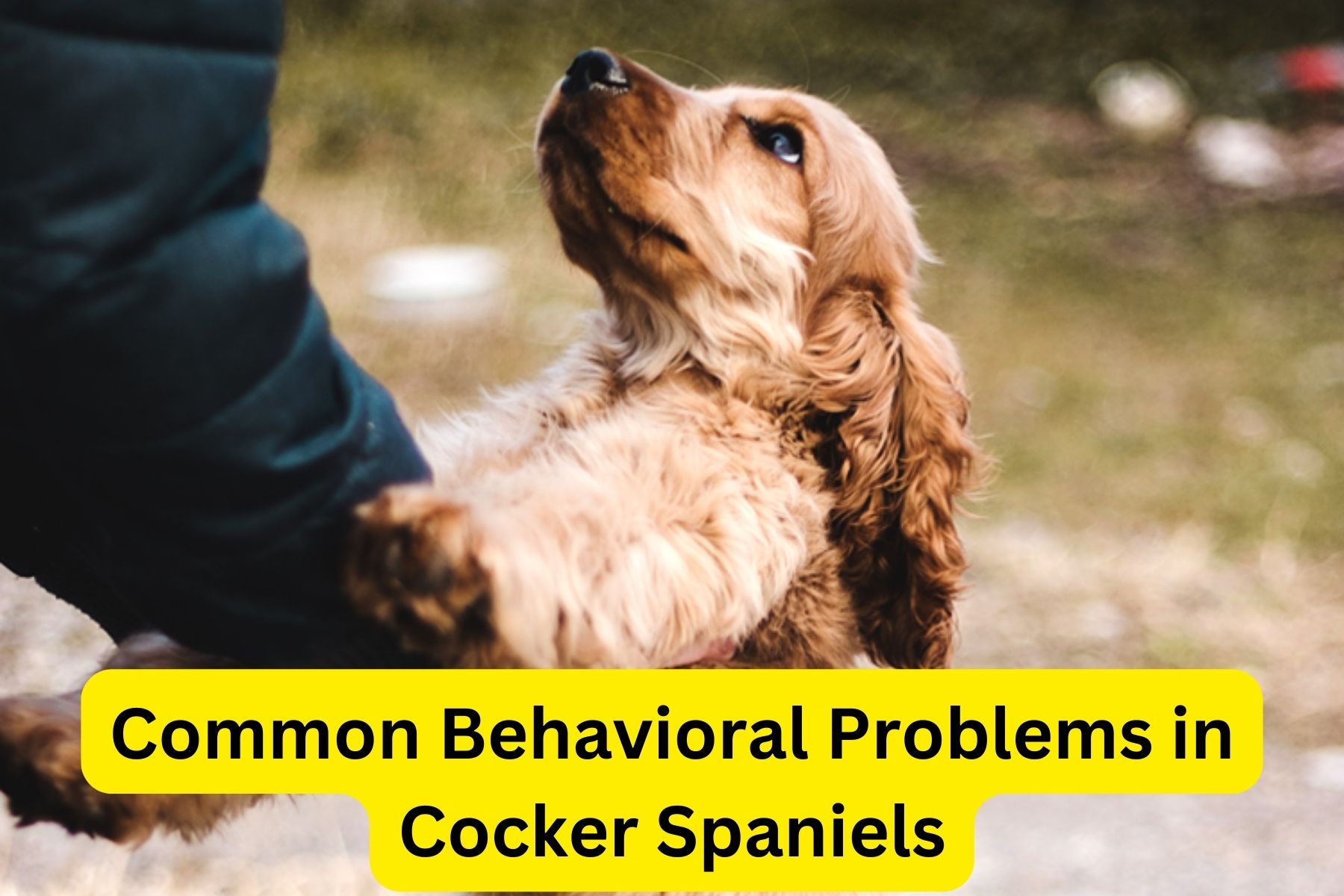Cocker Spaniels are beloved for their friendly temperament, intelligence, and loyalty. However, like all breeds, they can develop behavioral problems that can affect their quality of life and the relationship with their owners. Understanding these issues and how to address them is crucial for any Cocker Spaniel owner. In this comprehensive guide, we will explore common behavioral problems in Cocker Spaniels and provide effective strategies to manage and correct them.
Understanding Cocker Spaniel Behavior
Cocker Spaniels are known for their affectionate and sociable nature. They thrive on companionship and can develop behavioral issues if their needs for social interaction, mental stimulation, and exercise are not met. By understanding their natural instincts and behaviors, owners can better manage and prevent problems.

Key Factors Influencing Behavior
- Genetics: Some behaviors may be inherited. Understanding the lineage can provide insight into potential issues.
- Socialization: Early exposure to different environments, people, and other animals is crucial for developing a well-adjusted dog.
- Training: Consistent and positive training can shape a Cocker Spaniel’s behavior significantly.
- Environment: A stable and enriching environment contributes to a calm and happy pet.
Common Behavioral Problems
1. Excessive Barking
Cocker Spaniels are naturally vocal dogs. However, excessive barking can become a problem, signaling anxiety, boredom, or a lack of attention.
Causes
- Boredom or lack of exercise
- Separation anxiety
- Alerting to perceived threats
- Lack of proper training
Solutions
- Provide Regular Exercise: Ensure your Cocker Spaniel receives adequate physical activity through daily walks and playtime.
- Mental Stimulation: Engage your dog with puzzle toys and interactive games to keep their mind active.
- Training Commands: Teach the “quiet” command. Reward them when they stop barking on command.
- Desensitization: Gradually expose them to the stimuli that trigger barking (like the doorbell) in a controlled manner.
2. Separation Anxiety
Cocker Spaniels are known for their close bonds with their owners, making them susceptible to separation anxiety when left alone.
Causes
- Over-dependence on their owner
- Lack of training in being alone
- Sudden changes in environment or routine
Solutions
- Gradual Desensitization: Start leaving your dog alone for short periods, gradually increasing the time as they become more comfortable.
- Create a Safe Space: Designate a comfortable area where your dog can feel secure when you are away.
- Use Interactive Toys: Provide toys that can keep them occupied while you’re gone.
- Professional Help: In severe cases, consider consulting a veterinarian or animal behaviorist.
3. Aggression
While Cocker Spaniels are generally friendly, aggression can manifest due to fear, pain, or territorial instincts.
Causes
- Fear of unfamiliar people or animals
- Pain from an injury or health issue
- Poor socialization experiences
Solutions
- Identify Triggers: Observe when your dog displays aggression to understand the triggers.
- Desensitize: Gradually expose your dog to the triggers in a controlled environment.
- Positive Reinforcement: Reward calm behavior and discourage aggressive reactions.
- Seek Professional Help: For serious aggression issues, professional training may be necessary.
4. Chewing and Destructive Behavior
Cocker Spaniels may resort to chewing and other destructive behaviors out of boredom or anxiety.
Causes
- Boredom or lack of exercise
- Anxiety or stress
- Teething in puppies
Solutions
- Provide Chew Toys: Offer a variety of safe, durable chew toys to satisfy their urge to chew.
- Increase Physical Activity: Regular exercise can reduce boredom and excess energy.
- Redirect Behavior: If you catch your dog chewing on furniture, redirect them to an appropriate toy.
- Environmental Management: Limit access to areas where they can cause damage when unsupervised.
5. Jumping Up
Cocker Spaniels are social and may jump up to greet people, which can be problematic, especially for guests.
Causes
- Excitement or eagerness to greet
- Seeking attention
Solutions
- Ignore the Behavior: Turn away and do not engage until they calm down.
- Teach “Sit”: Train your dog to sit when greeting people. Reward them for sitting instead of jumping.
- Consistent Reinforcement: Ensure all family members follow the same approach to discourage jumping.
6. Fearfulness
Some Cocker Spaniels may exhibit fearfulness toward loud noises, unfamiliar environments, or new experiences.
Causes
- Lack of exposure to various stimuli during early development
- Traumatic experiences
- Genetic predisposition
Solutions
- Gradual Exposure: Introduce your dog to new sounds and environments gradually, rewarding calm behavior.
- Comfort Items: Provide toys or blankets that smell like you to help soothe their anxiety.
- Use Calming Products: Consider anxiety wraps or pheromone diffusers that may help reduce fear.
- Professional Assistance: If fearfulness significantly impacts their quality of life, consult a professional trainer.
7. Poor Recall
Many Cocker Spaniels struggle with recall, especially when distracted by their surroundings.
Causes
- Lack of training or inconsistent commands
- Distracting environments
- Boredom with training routines
Solutions
- Positive Reinforcement Training: Use treats and praise to encourage your dog to come when called.
- Practice in Controlled Environments: Start training in a quiet area with minimal distractions before moving to more challenging locations.
- Consistency: Use the same command every time and ensure all family members do the same.
8. Food Guarding
Cocker Spaniels may exhibit food guarding behavior, where they become aggressive or possessive over their food.
Causes
- Instinctual behavior from a competitive background
- Past experiences of food scarcity
Solutions
- Desensitize: Gradually allow your dog to get used to people being near their food while offering treats to create positive associations.
- Train “Leave It”: Teach your dog to leave their food on command, rewarding them for obeying.
- Provide a Safe Space: Feed your dog in a quiet area where they feel secure.
9. Hyperactivity
Cocker Spaniels may display hyperactive behavior, especially if they have excess energy.
Causes
- Lack of physical exercise
- Insufficient mental stimulation
- Anxiety or excitement
Solutions
- Increase Exercise: Ensure your dog gets at least an hour of physical activity each day.
- Structured Playtime: Incorporate structured play sessions that engage both mind and body.
- Calm Environment: Create a calm home environment that minimizes triggers for excitement.
10. House Training Issues
House training can be a challenge for some Cocker Spaniels, leading to accidents in the house.
Causes
- Inconsistent training methods
- Health issues or urinary tract infections
- Lack of routine
Solutions
- Establish a Routine: Take your dog out regularly, especially after meals and naps.
- Positive Reinforcement: Praise and reward your dog for going outside.
- Monitor Health: If accidents persist, consult a veterinarian to rule out medical issues.
Training and Behavior Modification Strategies
1. Positive Reinforcement
Positive reinforcement is the most effective training method for Cocker Spaniels. Reward desired behaviors with treats, praise, or playtime to encourage them to repeat those behaviors.
2. Consistency is Key
Be consistent with commands and rules. Ensure all family members are on the same page to avoid confusing your dog.
3. Patience and Understanding
Behavior modification takes time. Be patient with your Cocker Spaniel and understand that progress may be gradual.
4. Professional Training Classes
Consider enrolling your Cocker Spaniel in obedience classes. Professional trainers can provide valuable insights and support.
When to Seek Professional Help
If your Cocker Spaniel’s behavioral problems persist despite your best efforts, or if the issues are severe (like aggression), it may be time to consult a veterinarian or a certified dog trainer. They can provide tailored advice and support to help address your dog’s specific needs.
Conclusion
Cocker Spaniels are loving and loyal companions, but like all dogs, they can experience behavioral challenges. Understanding common issues and employing effective training strategies can lead to a happier, healthier relationship with your furry friend. By addressing these problems with patience and consistency, you can help your Cocker Spaniel thrive and enjoy a fulfilling life by your side.
Additional Resources
- Books on Dog Training: Consider reading books by professional dog trainers for more in-depth strategies.
- Online Training Courses: Explore online resources and courses for additional guidance.
- Veterinary Behaviorists: For severe behavioral issues, consult a veterinary behaviorist for expert advice.
By actively working to understand and address these common behavioral problems, you’ll not only improve your Cocker Spaniel’s quality of life but also strengthen the bond you share with your beloved pet.
